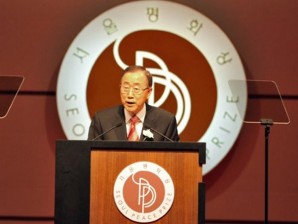North Korea crisis could spiral out of control—UN chief

United Nations Secretary General Ban Ki-moon. AFP FILE PHOTO
SEOUL—UN chief Ban Ki-moon warned Tuesday that the Korean peninsula crisis could spiral out of control, after North Korea announced it would restart a nuclear reactor to feed its atomic weapons program.
“Nuclear threats are not a game,” Ban said, responding to a series of aggressive statements by Pyongyang that have prompted the deployment of nuclear-capable US B-52s, B-2 stealth bombers and a US destroyer to South Korea.
The North’s announcement earlier Tuesday that it would reopen Yongbyon reactor — its source of weapons-grade plutonium — triggered international alarm, with Pyongyang’s only major ally China voicing regret and calling for restraint.
The Korean peninsula has been caught in a cycle of escalating tensions since the North’s February nuclear test, which followed a long-range rocket launch in December.
Subsequent UN sanctions and annual South Korea-US military exercises have been used by Pyongyang to justify a wave of increasingly dire threats against Seoul and Washington, including warnings of missile strikes and nuclear war.
Article continues after this advertisementThe UN secretary general called for calm.
Article continues after this advertisement“The current crisis has already gone too far,” the former South Korean foreign minister told a press conference in Andorra.
“Things must begin to calm down,” he said, adding that negotiations were the only viable way forward.
Ban also said he feared an escalation in the crisis.
“I’m convinced that nobody intends to attack the DPRK because of a disagreement about its nuclear system… however I’m afraid that others will respond firmly to any military provocation,” he said.
A Pyongyang government nuclear energy spokesman said the plans for Yongbyon would involve “readjusting and restarting” all facilities at the nuclear complex, including a uranium enrichment plant and the five-megawatt reactor.
The aim was to “bolster the nuclear armed force both in quality and quantity,” the spokesman was quoted as saying by the official KCNA news agency.
The North shut down the Yongbyon reactor in July 2007 under a six-nation aid-for-disarmament accord, and destroyed its cooling tower a year later.
Experts say it would take six months to get the reactor back up and running, after which it would be able to produce one bomb’s worth of weapons-grade plutonium a year.
North Korea revealed it was enriching uranium at Yongbyon in 2010 when it allowed foreign experts to visit the centrifuge facility there, but insisted it was low-level enrichment for energy purposes.
The mention of “readjustment” will fuel concerns that it will be upgraded — if it hasn’t been already — into a facility for openly producing weapons-grade uranium.
Kim Yong-Hyun, a North Korea expert at Seoul’s Dongguk University, said Tuesday’s nuclear initiative was in a different league from the military bluster of recent weeks.
“This goes beyond mere provocation. It’s a strong, tangible move and perhaps the one that will force the US into the direct dialogue Pyongyang wants,” Kim said.
The prospect of North Korea on a joint plutonium and uranium enrichment path is a hugely worrying one for the international community.
The North has substantial uranium ore deposits which provide a quick route to boosting reserves of fissile material, while plutonium has the advantage of being easier to miniaturize into a deliverable nuclear warhead.
“The international community has spent years working to stall and roll back the North’s nuclear program,” said Mark Fitzpatrick, director of the non-proliferation unit at the International Institute for Strategic Studies in London.
“If the North now does what it says it’s going to do, it’ll be pushing ahead with both barrels,” Fitzpatrick told AFP.
Many observers believe the North has been producing highly-enriched uranium in secret facilities for years, and that the third nuclear test it conducted in February may have been of a uranium bomb.
Its previous tests in 2006 and 2009 were both of plutonium devices.
The nuclear announcement followed a top-level meeting Sunday of the North’s ruling party, at which young leader Kim Jong-Un stressed the importance of upgrading the “quantity and quality” of the country’s nuclear arsenal.